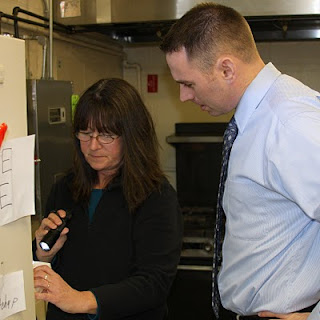Listen to the commentary
Real Audio : MP3 download
As director of operations at Westville Community Schools, Seth Miller bears a wide range of responsibilities, among them, pest control. For years, this meant maintaining a contract with a commercial pest control company, which would come in on a routine basis to spray, while the custodial staff worked to control rodents.
Like others around the state in his position, Miller was aware that Westville was required to implement a new approach called “Integrated Pest Management,” or IPM, but as of last April, he was just beginning to figure out how to do it.
That’s when he met Susan Ratcliffe, director of the North Central Integrated Pest Management Center. At a school IPM training meeting Miller attended, Ratcliffe announced she was looking for a school district to serve as a model for verifiable IPM in Illinois—and that she had substantial resources to help implement it. Miller leapt at the opportunity.
What Ratcliffe was offering was the collaborative help of University of Illinois Extension, the Illinois Department of Public health, and other national experts in school IPM, a package worth $25,000.
According to Ratcliffe, there are compelling reasons for retiring the current routine of spraying for insects that occurs in most schools in favor of IPM, chief among them the links between pesticide exposure, asthma and increased absences. She also points out that there’s much we don’t know the long-term health effects of exposure to pesticides in schools.
The goal of IPM is not to eliminate the use of pesticides entirely, but to greatly reduce their use by making human environments less conducive to pests in the first place. This includes eliminating access to food, removing habitat and closing off travel corridors.
 Some of the greatest challenges the IPM team identified in Westville’s schools were where you might expect them, in the cafeterias, the teacher’s lounges and in classrooms where food is stored and prepared. [Photo: Susan Ratcliffe and Seth Miller check the sticky trap at an IPM monitoring station in the cafeteria kitchen at Westville high school.] Teachers, other staff and students have all helped to resolve these challenges by changing their practices, moving all food into plastic containers with tight-fitting lids, and not leaving dishes with food residue to sit on counters or in sinks.
Some of the greatest challenges the IPM team identified in Westville’s schools were where you might expect them, in the cafeterias, the teacher’s lounges and in classrooms where food is stored and prepared. [Photo: Susan Ratcliffe and Seth Miller check the sticky trap at an IPM monitoring station in the cafeteria kitchen at Westville high school.] Teachers, other staff and students have all helped to resolve these challenges by changing their practices, moving all food into plastic containers with tight-fitting lids, and not leaving dishes with food residue to sit on counters or in sinks.Teachers were also important agents in the project of eliminating habitat. They removed clutter and items attractive to pests from classrooms and they exchanged cardboard boxes for plastic tubs to store materials they wanted to keep.
Members of the custodial staff at Westville schools, led by Tyrone Atwood, have been especially enthusiastic and effective in helping to implement IPM. They are the ones who maintain the high level a sanitation that is key to successful pest management and they work with the IPM team to seal out pests and eliminate pest conducive conditions.
The effectiveness of the steps implemented to control pests through the IPM program is gauged at monitoring stations throughout the schools. At each of these there is a sticky trap on the floor to catch pests, and a notebook for recording what’s found there. When something is caught, the team makes a management decision based on pest type and its location within the schools.
The institution of the IPM program at Westville schools has not caused Seth Miller to sever ties with the commercial pest control technician who had done the spraying there in the past, but it has changed what the district asks of him. He is now called in to help diagnose and treat specific problems rather than to spray as a routine, and pesticide applications have been reduced by 87 percent.
When I asked Miller to comment on why he had adopted IPM with such enthusiasm he replied, “Number one, it’s the law. But beyond that, it’s the health of your kids, and the health of your community.”
For more information about school IPM and training contact Susan Ratcliffe at 217-333-9656.



